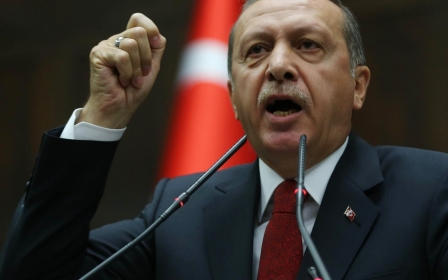Marxist-Leninist group claims responsibility for Istanbul suicide attack

A militant Marxist-Leninist organisation has claimed responsibility for a suicide bombing in Istanbul, claiming the blast was in retaliation for the death of teenager Berkin Elvan.
A 20-year old female member of the Marxist Revolutionary People's Liberation Party–Front (DHKP-C), a group listed as a terrorist organisation by the US, EU and Turkey, blew herself up in Istanbul's historic Sultanahmet district, a popular destination for tourists.
“Our sacrificial fighter... carried out the sacrificial action on the tourist police department in Sultanahmet," the group said in a statement.
"It is the same state which shot Berkin Elvan and which protects the thief ministers," it said, referring to the decision of a parliamentary commission not to send four ex-ministers to a higher court over allegations of graft.
The DHKP-C also claimed responsibility for a grenade attack on police near the Prime Minister’s office in Istanbul last week.
15-year old Berkin Elvan was shot in the head by a tear gas canister during the anti-government protests which rocked Turkey in June 2013, reportedly while venturing out to buy bread.
He died on March 11 after spending 269 days in a coma. His funeral attracted tens of thousands of mourners and provoked outpourings of fury at the Justice and Development party (AKP)-ruled government, further stoked by then Prime Minister Recep Tayyip Erdogan’s accusation that the teen had been a "member of a terrorist organization.”
In March 2014, the armed wing of a Marxist-Leninist-Maoist group, the Communist Party of Turkey/Marxist–Leninist (TKP-ML), carried out an attack on a police station in Tunceli, in Eastern Anatolia, also reportedly in retaliation for Elvan’s death.
The DHKP-C was first established in 1978 as a splinter of the Turkish People's Liberation Party-Front (THKP-C) and has been involved in a long-running insurgency against the Turkish state which is sees as a tool of US and NATO imperialism.
In 2012, a member of the Kurdistan Workers Party (PKK) shot and left comatose Asuman Akça, a former member of the DHKP-C, reportedly just before she was planning to expose links between the group and the shadowy Ergenekon organisation.
Ergenekon is an alleged covert ultra-nationalist organisation said to be at the heart of almost every act of violence in Turkey over the last 30 years. The PKK, the ultra-nationalist Grey Wolves paramilitary group, DHKP-C and others are all claimed to receive direction from the organisation.
Many have questioned the existence and reach of Ergenekon, with government critics claiming it has been used a tool by Erdogan and the AKP to silence dissent and arrest anti-government activists.
Fears over violence by militants in Turkey have been heightened by the neighbouring war in Syria. Fighting between the PKK, who are outlawed as a terrorist organisation in Turkey, and the Islamic State group in Syria have threatened to undermine an already fragile peace process between the Turkish state and the Kurdish group, leading to renewed attacks within Turkey's borders.
Stay informed with MEE's newsletters
Sign up to get the latest alerts, insights and analysis, starting with Turkey Unpacked
Middle East Eye delivers independent and unrivalled coverage and analysis of the Middle East, North Africa and beyond. To learn more about republishing this content and the associated fees, please fill out this form. More about MEE can be found here.




